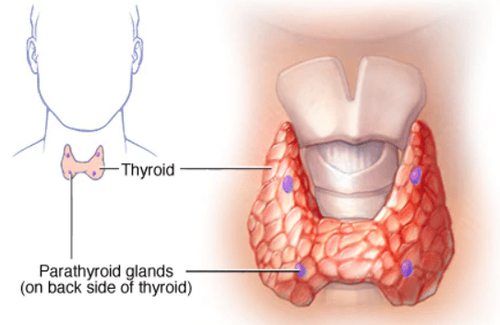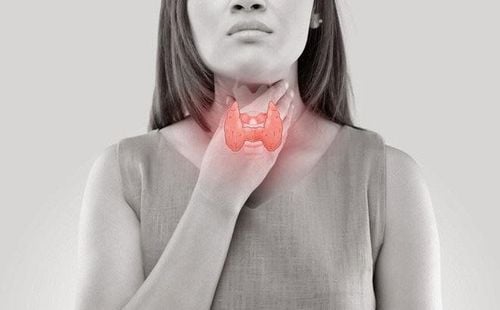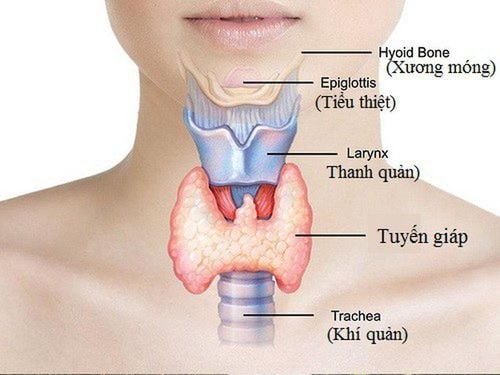This is an automatically translated article.
The parathyroid gland is a set of four small glands behind the thyroid gland. They are important for bone health. These glands control the body's calcium and phosphorus levels. Hyperparathyroidism and hypoparathyroidism are characterized by changes in blood calcium levels and bone metabolism. It is a condition of excess or lack of parathyroid function.
1. What is the parathyroid gland?
The parathyroid glands are four small glands of the endocrine system that regulate calcium in the body. The parathyroid glands are located in the neck behind the thyroid, where they continuously monitor and regulate blood calcium levels.
The parathyroid gland helps control calcium levels in the blood, in the bones, and throughout the body. The parathyroid gland regulates calcium by producing a hormone called parathyroid hormone (PTH). Calcium is the most important element in our body (we use calcium to control many organ systems). So calcium is more carefully regulated than any other factor. The parathyroid gland is usually about the size of a grain of rice. Sometimes they can be as big as a pea and that's normal.
The parathyroid glands share a common blood supply, venous drainage, and lymphatic drainage to the thyroid gland. The parathyroid glands are derived from the epithelial layer of both the third and fourth pharyngeal sacs. With the superior parathyroid glands arising from the secondary sac and the inferior glands arising from the higher third pocket. The relative positions of the downlines and the uplines are named after their final positions. Post-change is due to the migration of embryonic tissues.
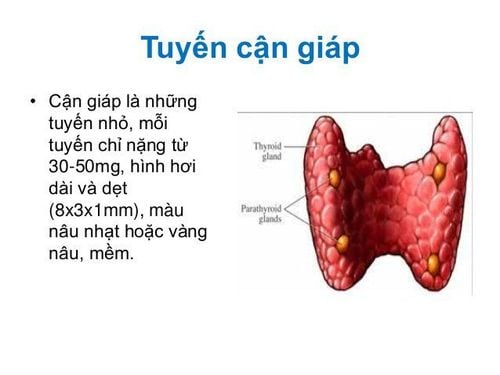
Parathyroid hormone (PTH) has a strong effect on bone cells such as:
Regulates the amount of calcium absorbed from the diet (the amount of calcium excreted by the kidneys and the amount of calcium stored in the bones) . Store more calcium in the bones and make it available to the rest of the body as required by the parathyroid glands Increases the formation of active vitamin D and it is the action of vitamin D that increases the absorption of calcium and phosphorus in the intestines
2. The role of the parathyroid gland in the endocrine system
Calcium is an essential substance for life used for:
Provide electrical energy to the nervous system. The most important thing that calcium does for the body is to provide the means for electrical impulses to travel along nerves. This is why the most common symptoms of thyroid disease and high calcium levels are related to the nervous system (depression, weakness, fatigue...). Provides electrical energy to the muscular system. Like nerves in the body, muscles also use changes in calcium levels within cells to provide energy for muscle contraction. When calcium levels are not correct, the body becomes weak or suffers from muscle cramps Provide strength to the skeletal system: Calcium is used to make bones strong. The bones themselves act as a storage system that the body uses to ensure the best calcium supply is always available. Like a bank vault where money can be deposited and withdrawn. Calcium is also continuously taken into the bones and continuously removed from the bones. However, all the calcium of this process is only a small amount. Its sole purpose is to maintain and keep accurate calcium levels. Therefore, the most important role of calcium is to provide the proper functioning of the nervous system, while providing bone strength is secondary.
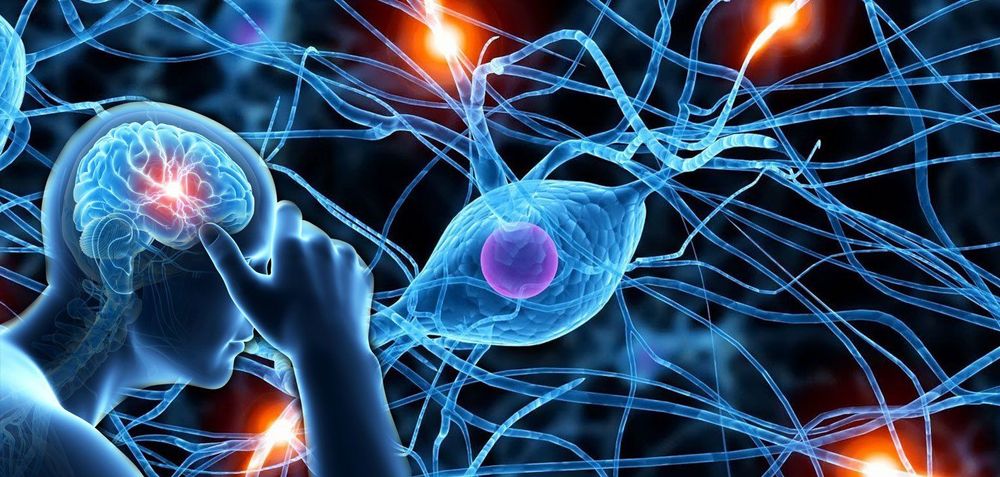
Tuyến cận giáp cung cấp năng lượng điện cho hệ thống thần kinh
Therefore, calcium is the most tightly regulated element in the body. In fact, calcium is the only mineral that has its own regulatory system, the parathyroid glands. No other gland in the body can regulate this role. Because, human nervous system is different from other species and calcium provides electrical system for nervous system. When calcium levels are high (almost always due to an underactive parathyroid gland) there are personality changes and many other neurological symptoms. So, parathyroid disease is not only caused by osteoporosis and kidney stones, but mainly by feeling and enjoying each person's life.
The sole purpose of the parathyroid glands is to regulate calcium levels in the body within a very narrow range so that the nervous system and muscles can function properly. The parathyroid gland measures the amount of calcium in the blood every minute and if the calcium levels drop it will recognize and produce parathyroid hormone (PTH) which goes into the bones and takes calcium from its storage and sends it into the bloodstream. When blood calcium is high enough, the parathyroid glands stop working and stop making parathyroid hormone (PTH).
3. Diseases and disorders of the parathyroid gland
When the parathyroid gland releases too much or too little of the hormone PTH. It will adversely affect the body in many different ways. Here are some common diseases and disorders related to the parathyroid glands:
Hyperparathyroidism: The most common disease of the parathyroid glands is hyperparathyroidism which is characterized by excess PTH hormone, regardless of the concentration. Which calcium level? In other words, the parathyroid glands continue to make large amounts of PTH even when calcium levels are normal. Hypoparathyroidism: Hypoparathyroidism is a combination of symptoms caused by insufficient production of parathyroid hormone. This leads to decreased blood calcium levels (hypocalcemia) and increased blood phosphorus levels (hyperphosphatemia). This is a rare condition and usually occurs as a result of damage or removal of the parathyroid gland during parathyroid or thyroid surgery. Osteoporosis: When one of the parathyroid glands is overactive, it secretes more of the hormone PTH. This will cause the bones to release calcium continuously into the bloodstream. When there is not enough calcium in the bones, the bones lose bone density and bone strength.
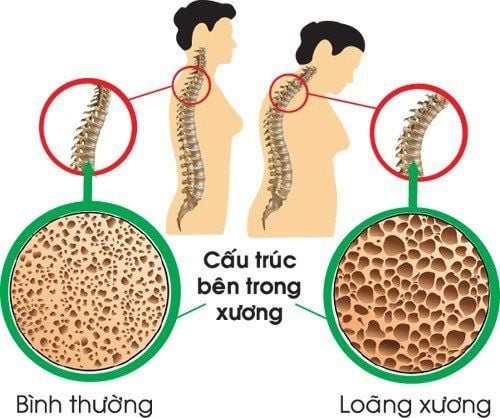
Loãng xương do tuyến cận giáp hoạt động quá mức
The parathyroid glands have a sole responsibility of regulating calcium levels. Glands are important members of the endocrine system, but they are also integral to the functioning of the nervous and muscular systems.
Vinmec International General Hospital is one of the hospitals that not only ensures professional quality with a team of leading medical doctors, modern equipment and technology, but also stands out for its examination and consultation services. comprehensive and professional medical consultation and treatment; civilized, polite, safe and sterile medical examination and treatment space. Customers who choose to perform services here can be completely assured of the results. In addition, customers will be examined with a specialist to determine the risk of disease and have a scientific treatment direction.
Customers can directly go to Vinmec Health system nationwide to visit or contact the hotline here for support.
References: webmd.com, parathyroid.com, hopkinsmedicine.org
Recommended videos:
Routine health check at Vinmec: Protect yourself before it's too late!
MORE
Complications that can be encountered if thyroid hormone deficiency is common Thyroid diseases and treatment There are 10 signs, immediately think of thyroid disease




